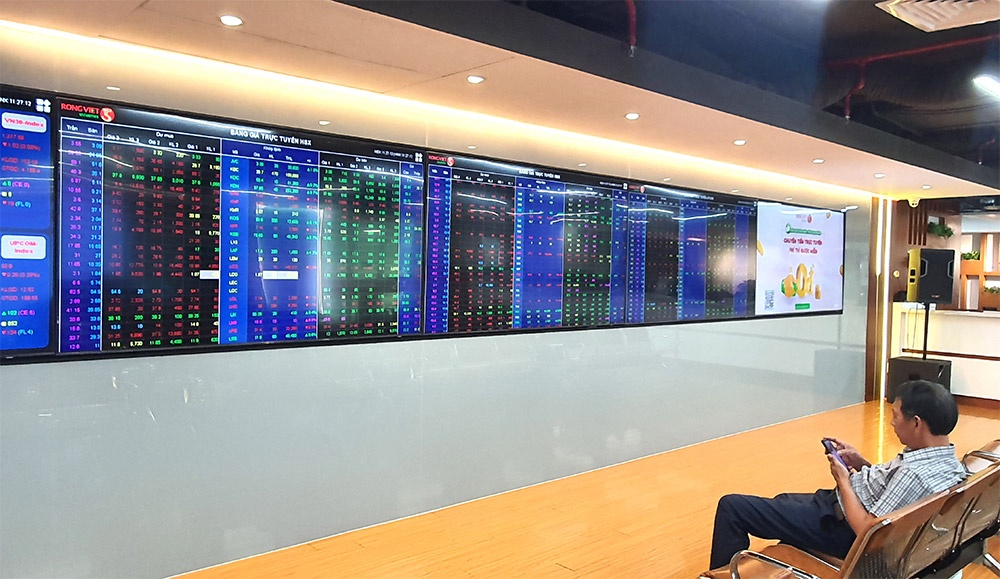Crackdown on the way in stock market
 |
| The proposed rules would prohibit insider trading by company executives and public fund managers, photo Le Toan |
Last week, the Ministry of Finance (MoF) announced a draft amendment to seven laws, including the Securities Law, proposing the addition of several prohibited activities in the securities market to curb stock manipulation.
“It is unprecedented to address a situation where one law seeks to amend seven financial laws. The government and the MoF are working to revise the laws to meet emerging practical demands, promptly address limitations and risks in the stock market’s operation, enhance the enforcement of the law, and protect the legal rights and interests of investors,” stated the MoF.
Legalising regulations regarding stock market manipulation includes specific acts such as buying or selling large volumes of stocks during market opening or closing hours, placing buy and sell orders for the same stock on the same trading day, or conspiring with others to engage in transactions that do not lead to actual transfer of ownership.
“The MoF’s revision of the Securities Law is a starting point for restoring investor confidence in the stock market,” said Do Bao Ngoc, deputy CEO of CSI Vietnam Construction Securities. “Every nascent market must go through early stages of development, rife with manipulation aimed at benefiting interest groups. If not addressed, the stock market may be plagued by shell companies used for speculative manipulation, leading to substantial financial losses and eroded trust.”
Additionally, the draft proposes to prohibit acts related to insider trading by company executives, public fund managers, and related individuals who fail to disclose their intention to trade stocks or public fund certificates.
“The market should be a platform for high-quality companies, attracting long-term investments from individuals and institutions, contributing to the capital market’s support of high-growth businesses that add value to the economy and society,” added Ngoc.
A series of market manipulation cases, including creating fake supply and demand, have recently caused thousands of investors to suffer heavy losses as related stock prices plummeted.
In the first week of September, the Police Investigation Agency in Hanoi pressed charges against seven individuals for stock market manipulation, inflating prices for profit related to stock of CMH Vietnam Group. Over a span of five months, these individuals conspired via social media to manipulate the stock, profiting by over $415,000.
“The proportion of individual investors directly participating in Vietnam’s stock market is considerable, which is different from markets like the US or Europe,” said economic expert Dinh The Hien. “Individual investors often lack the ability to deeply analyse companies or individual stocks like institutional funds, and they can easily be swayed by crowd psychology, combined with a desire for quick gains. It is only when they suffer significant losses that they turn to blaming regulators for not issuing warnings and failing to manage the market strictly enough to prevent manipulation schemes.”
One of the most notorious cases of stock market manipulation occurred at FLC and its related entities, with former chairman Trinh Van Quyet being sentenced in August for market manipulation and fraud. Quyet had directed his subordinates to inflate the charter capital of FLC Faros, embezzling over $150 million and engaging in multiple large stock transactions without disclosing information.
However, for investors in some stocks, the investigative agency concluded that there was insufficient evidence to address claims of investor losses caused by Quyet’s and his associates’ manipulation, based on findings from the Ministry of Finance’s audit.
This was not the only case where authorities could not determine the actual losses of investors due to the illegal acts of manipulators. In the case involving Louis Holdings and Tri Viet Securities, which resulted in illegal profits of $6.4 million and concluded with sentencing late last year, judicial authorities were unable to identify the affected shareholders or determine the actual losses suffered by investors.
The lack of clear evidence to determine investor losses caused by Trinh Van Quyet, Do Thanh Nhan, and their accomplices has raised public concerns about the protection of investor rights, especially in the stock trading sector.
“In the short term, rather than thinking about new solutions, if the State Securities Commission, stock exchanges, securities companies, and auditing firms simply perform their roles properly, the stock market will undoubtedly improve,” explained expert Hien. “If auditing firms rigorously verify the financial reports of listed companies, reflecting accurate data, and regulators strictly monitor the proliferation of trading accounts, transparency in the stock market will improve significantly.”
 | The prospects for foreign exhange market for rest of 2024 Economist Le Xuan Nghia talked to Hong Dung about the forex market's prospects for the rest of this year and looks at how to bolster liquidity for sustainable economic development. |
What the stars mean:
★ Poor ★ ★ Promising ★★★ Good ★★★★ Very good ★★★★★ Exceptional
 Tag:
Tag:
Related Contents
Latest News
More News
- Raised ties reaffirm strategic trust (February 20, 2026 | 14:06)
- Sustained growth can translate into income gains (February 19, 2026 | 18:55)
- The vision to maintain a stable monetary policy (February 19, 2026 | 08:50)
- Banking sector faces data governance hurdles in AI transition (February 19, 2026 | 08:00)
- AI leading to shift in banking roles (February 18, 2026 | 19:54)
- Digital banking enters season of transformation (February 16, 2026 | 09:00)
- IFC to grant $150 million loan package for VPBank (February 13, 2026 | 09:00)
- Nam A Bank forms position as strategic member at VIFC through three key partnerships (February 12, 2026 | 16:39)
- Banks bolster risk buffers to safeguard asset quality amid credit expansion (February 12, 2026 | 11:00)
- VNPAY and NAPAS deepen cooperation on digital payments (February 11, 2026 | 18:21)

















 Mobile Version
Mobile Version